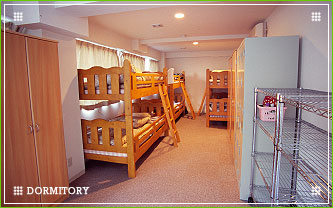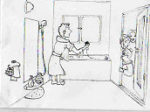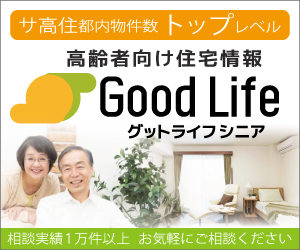
“入居者募集! 築20年新築同様”これは30年前、古都ロンドンで見かけた不動産広告である。決して『トリビアの泉』ネタではない。何かの間違いか、それともオトリ広告かと他の広告も見てみたが、やはりどの広告にも“築20年、築25年新築同様”の表記があった。新築同様とは築1~2年程度と思っていた私には、これはただの誇大広告ないしオトリ広告としか最初は思えなかった。だが、ロンドンでは築100年を超す建物は珍しくなく、そういった古い建物を、さらに自分達でリフォームしながら、ゲストハウスとして運用している若者などもいて、不動産広告の“築20年新築同様”は決して嘘でないと思えた。
さて、欧米に比較し建物寿命が極端に短い日本だが、最近その寿命に変化が現れだした。2003年以降の新築大型ビルラッシュは、中古ビル市場にテナント不足という深刻な事態をもたらしたが、一方、空きビル対策としてコンバージョン(用途変更)が推進されるきっかけとなった。それは、従来の“スクラップ&ビルド”方式ではなく、用途を変えることで建物を生かし、長く維持しようとする考え方である。テナントの集まらない中古ビル、少子化の影響で学生が居なくなった学生寮、そして経費削減のあおりを受け閉鎖された社宅などが、大規模改修を必要としないゲストハウスへのコンバージョン対象として検討され始めた。
個人の戸建てや小規模アパートの用途変更から始まったゲストハウスであるが、「2003年問題」が思わぬフォローの風となり、空きビル、空き寮対策として注目されるようになり、個人経営者のみでなく不動産会社などの企業がその事業に参加し始めた。現在、ゲストハウスは都内近県でその数を徐々に増やし、また規模自体も大型化している。
我が社が運営している大型ゲストハウスとしては、埼玉県新座市と千葉県松戸市に学生寮を転用したものがある。両方とも地上5階建、6階建のコンクリート造りで築年数もまだ15年足らずと新しい(イギリスであれば、さしずめ新築同様である)。建物の世帯数はそれぞれ80戸、160戸と多く、常に20ケ国以上の人がそこで生活をしている。また、設備については学生寮という建物の特殊性をそのまま生かし、台所、トイレ、お風呂は共同である。国内最大規模である千葉のゲストハウスには、サウナ室、アスレチックルーム、映画鑑賞室なども用意され、中庭ではバーベキューパーティーなどもできるよう設備が備わっている。
Column 7: Growing Guest Houses – Part 1 “2003 Problem” Follows as a Tailwind
“Vacancy! 20-year-old building like new construction” This was a real estate advertisement I saw in the ancient city of London 30 years ago. It’s not just a “Trivia no Izumi” fact. At first, I thought it was a mistake or a lure, but when I looked at other ads, all of them had the phrase “20-year-old, 25-year-old building like new construction.” I thought that “like new construction” meant about 1-2 years old, but in London, buildings over 100 years old were not uncommon. Young people were running guesthouses in such old buildings, renovating them themselves, and seeking new encounters and interactions beyond their own country and culture. Therefore, the real estate ad “20-year-old building like new construction” was not a lie.
Although Japan is a country with a shorter building lifespan compared to Europe and America, changes in the lifespan of buildings have started to appear recently. The rush to construct new large buildings since 2003 has caused a serious shortage of tenants in the second-hand building market, but on the other hand, conversion to guesthouses has been promoted as a countermeasure to vacant buildings. It is a way of thinking that seeks to keep the building alive for a long time by changing its use, rather than the conventional “scrap and build” method. Second-hand buildings with no tenants, student dormitories without students due to the effects of declining birthrate, and company housing that has been closed due to cost-cutting measures have begun to be considered as candidates for conversion to guesthouses that do not require large-scale renovation.
The guesthouse, which began with the conversion of individual detached houses and small-scale apartments, has attracted attention as a countermeasure to vacant buildings and dormitories as a result of the “2003 problem” unexpected tailwind. Not only individual operators, but also corporations such as real estate companies, have begun to participate in this business. Currently, the number of guesthouses is gradually increasing in and around Tokyo, and the scale itself is also becoming larger.
Our company operates a large guesthouse that was converted from a student dormitory in Shinzaka City, Saitama Prefecture and Matsudo City, Chiba Prefecture. Both are concrete structures with five or six floors, and they are still relatively new, with less than 15 years since construction (which would be considered “like new construction” in the UK). Each building has a large number of households, with 80 and 160 respectively, and over 20 countries are represented by the residents. As for facilities, the special nature of a student dormitory building has been used as it is, with shared kitchens, toilets, and baths. The largest guesthouse in Japan, located in Chiba, also has facilities such as a sauna room, athletic room, and movie theater, and the courtyard is equipped with facilities for barbecues and other events.













